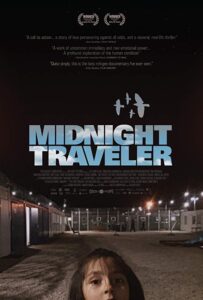First person account hits hard.


“I’m a filmmaker; it’s part of my work.” Afghan director Hassan Fazili frankly tells a news reporter in Bulgaria. The reporter a bit nonplussed, probably used to the public holding up their phones and claiming that they are making a movie. The news crew is there to interview Hassan about being attacked by locals. The Fazili’s are Afghan refugees seeking asylum that has moved across several countries, facing danger and frustration.

It’s been said that the best camera is the one you have with you. And the growth of mobile technology has allowed oppressed populations to expose hardship and injustice. Many filmmakers have used smartphones, including Iranian director Jafar Panahi, whose film “This is Not a Film” was shot on his iPhone out of necessity. More and more, artists are utilizing readily available tools to tell meaningful stories.
“Midnight Traveler” is a harrowing road trip documentary. After making a movie that criticized the Taliban, a bounty is placed on Hassan’s head. This threat forces him and his family to flee Afghanistan. It’s the start of a distressing, infuriating journey. Hassan, his wife, and two young daughters pack up all of their worldly possessions and make a risky trek across many borders seeking a safer home. It’s a heartrending story that intimately takes us inside the harshness of a region torn by religious and economic strife.
Viewers might take some time to adjust to this film’s visual scope. The images, shot on a variety of smartphones, range from rough to downright beautiful. It’s this familiar mobile device visual scope that instantly gives everything a deep authenticity. The lack of image stabilization, focus inconsistencies, and low light noise and artifacting, helps to further imbue the picture with a “you are there” feeling. It’s part of the texture of the narrative that plays out like a kind of thriller within the confines of the documentary format.

As remarkable as the images and story are, it is surprising that any of the footage ever saw the light of day. As Hassan captured video across several countries, writer and editor Emelie Mahdavian had a logistical problem to solve. He managed to work out a way to copy the files from SD cards to hard drives and get them back to his country for editing. Given the hard-scrabble lifestyle of the Fazilis, it’s incredible that anything shot survived their ordeal. At times, the family sleeps in empty buildings, refugee camps, in the outdoors, in cars and buses; the conditions were harsh. But the whole time, Hassan keeps rolling, and we’re all the better for it.
“Midnight Traveler” is an unsettling sign of the times. It gives viewers, far removed from the struggles of people in war-torn countries, an intimate look at a way of life that no child, no one should ever endure.
